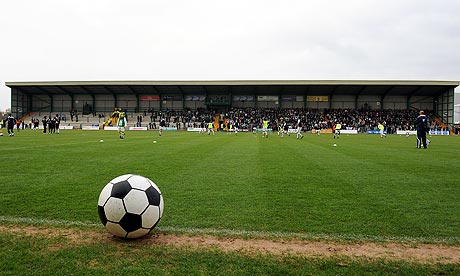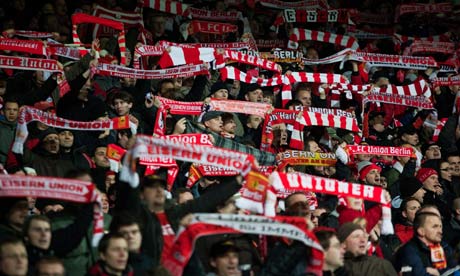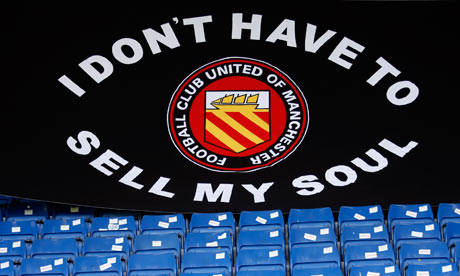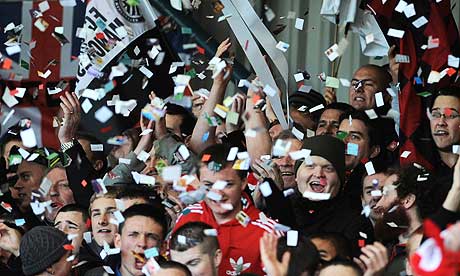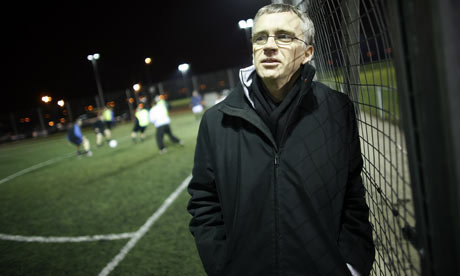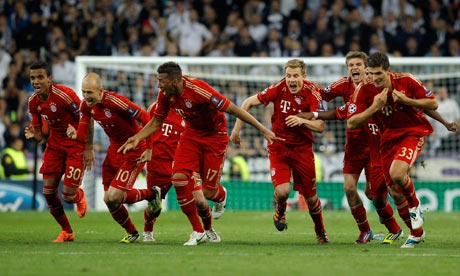 |
| Supporter-owned Bayern Munich are enjoying yet another successful season. Photograph: Daniel Ochoa De Olza/AP |
Co-operatives offer a sustainable model for football clubs - just ask Champions League finalists Bayern Munich
What's the point of a football club? If we look at the motives of its owners, we'd get some strange answers. It could be a millionaire's pension fund, a property development opportunity, a shot at a capital gain, a millstone, a tax dodge, an ego-trip, a nest-egg, a birthday present, a promotional tool, a political tool; the list is far from exhaustive.
No club was ever founded with this in mind, of course. They began life as genuine clubs, open to membership from the community of players, and later supporters, who had an interest in their success.
But over time – mainly for the need to raise capital to build stadia – clubs became companies, and lots of members gave way to a smaller number of shareholders. They coalesced over time and soon clubs were dominated by a small handful of people, most eventually becoming the private property of a single person.
This seems at odds with the true nature of the enterprise, which has an inherently public character. Football's magic is to take all the emotions that define what a club means to one fan and make it equate to those of every one of the hundreds, thousands or millions of people who share the same allegiance. Football serves a deep human need for community, and that – plus the unscripted drama of the game – explains its success. We love our clubs because of what they are, not for what they do for their owners or employees.
That's why a co-operative form is a perfect fit with football, because in a co-op economics flow from purpose, not the other way around. In Europe, co-operative and mutual ownership is commonplace, with almost a quarter of the top-flight clubs in UEFA's 53 member countries being owned and run this way. When Bayern Munich play in the Champions League final in 10 days' time, they will make it the 14th final in the past 21 years to feature a fan-owned and run club.
Here, though, the battle to bring the values and virtues of co-operatives to bear only really began in the past decade, starting in earnest with the formation of Supporters Direct in 2000.
The supporters co-operatives they set up have been slowly building their influence and now own the controlling stake in 25 clubs. The highest-placed is Brentford in League one. Sixteen more have a minority stake greater than 10%, while a fan is elected onto the board to represent fans at 46 clubs; Swansea City in the Premiership is the highest profile, with their fans co-operative owning 20% of the club and having lifelong fan Huw Cooze on the Board.
Swansea's success illustrates a problem facing supporters' co-ops; that they tend to make gains when clubs are in crisis. When the previous owners ran Swansea into the ground, fans got their break and purchased it alongside four local businessmen for a fraction of what it is now worth, because no one else was interested. All those other motives – pension fund, development and the rest – fade away, leaving only love and loyalty to drive prospective owners of last resort.
Where the club isn't in crisis (football's version of rude health), fans struggle to get the required liquidity quickly enough to beat rivals when existing owners look to sell up.
As a result, most experiences of fan ownership begin with a monkey on the club's back. Where they takeover, they do so with inherited debt. Where they form a new team to replace a liquidated predecessor (such as at Scarborough Athletic), they often start minus a ground, which will have been lost in the collapse of the old club.
But to see what can be done if a club can get past the problems, just look at Exeter City. Fans took on debts of £1m, but instead of labouring for years to pay them off, they drew Manchester United in the FA Cup and with their share of the attendance money, wiped those debts out in a stroke.
They've had the chance to build, rather than just deal with the mistakes of the past, and have seen the club achieve two of the five promotions in its history, finish as high as they ever have up the footballing pyramid and are enjoying a 60% increase in attendance. These are the good old days for the club.
But they also embody the biggest problem supporter co-operatives face. Like all co-operatives, they must be profitable, since their only source of revenue and capital is their members. This marks them out as oddities in the world of football, where clubs are run as extensions of their owners' interests and underwritten by their private wealth; making a surplus is a nice idea, but one rarely achieved.
This is particularly ironic given the way the existing powers view fan involvement in clubs. I've been in offices in the Premier League and Football League, where executives have cartoons on the wall showing how "unreasonable" fans are: speech bubbles from the terraces call for all the best players in the world to be signed with scant consideration for the financial implications.
It was a point made in more formal ways than cartoons. Many chairmen told Supporters Direct that fan involvement would lead to financial catastrophe. Coming from people in charge of a sector in which more than 50% of its professional business have become insolvent since 1992, this is more than a little hypocritical.
But the ruinous economics they have presided over is rigged against people who want to be sane and sustainable, like supporters co-operatives must be. Players' wages bear less relationship to what the clubs employing them can actually afford on their own generated trading income, and rely instead on subsidies from their wealthy owners.
In other co-operatives, seeing other businesses act stupidly is good news, for virtue has its own reward. Not so in football, where sitting out the madness isn't an option. That isn't from unreasonable fans demanding success but from them being disenchanted with the idea that a weaker squad's outcome for the season is already decided before a ball has been kicked.
For many of the clubs where fans call the shots, this isn't a problem – yet – as they play in the lower leagues of the football pyramid where their larger fanbase more than compensates, but the ultimate success of fan co-operatives depends on the game being made safe for people who think it's a good idea that clubs don't lose money hand over fist.
After years of opposing any regulations to help bring this about, there's been a sea change in attitudes, as UEFA's imposition of such rules has demonstrated the power of regulatory bodies to act. That, combined with the size of debts in the midst of a recession, has concentrated minds, and across all four divisions there are measures in
place to bring costs under control. These new rules still have many loopholes, and there is a real issue that the changes won't come about quickly enough for co-operative clubs, whose ability to keep pace by generating new income from members is more constrained in a recession.
To really change the face of football will take more than waiting for basket cases to finally come into fan ownership. Their commitment to openness, sustainability and community engagement should compel more active support from the game's authorities. However, their position of "ownership neutrality" is in reality to be against it, given the impediments it faces. Real support will be needed from government.
The coalition government took office with a pledge to "encourage co-operative ownership of clubs by supporters", and for a time there were encouraging signs that there might be genuine progress. The DCMS select committee published a report endorsing, amongst other things, fan involvement in clubs and on boards. Yet despite initially agreeing with the report, the government then pronounced itself satisfied with a response from the game's governing powers that pretty much ignored all of these ideas.
Politicians have been comfortable with willing the ends of fan ownership, but if it is to really take root in the UK, like in so many areas, they need to will the means, even if that means going beyond their generation-long stance of non-intervention in the economic sphere.
In the meantime, the biggest hope comes from the community shares scheme used by FC United of Manchester. The club, formed by fans of Manchester United disgruntled not just at the Glazer takeover, which saw their loyalty "monetised" to pay for the leveraged buyout by their absentee owners.
Underpinning the club was a new vision of what the point of a football club was, one much more in keeping with the founding ethos of the game and the community basis of clubs.
They were successful in raising £1.6m from 1,400 fans, an impressive feat at any time, not least in the current economic climate. While their success is built on years of engagement with fans, which many fans' co-operatives need to emulate, it does hold out an intriguing and co-operative outcome.
Having been subject to flirtations with the stock exchange and securitisation, football clubs are now in a position where serious investors know they will lose some or all of their money. Banks had come to the same judgment years ago, with football being one of the few areas in the years leading up to the crash where they seemed to show restraint in who they lent to.
The main sources of capital – or revenue subsidy as it is in most cases – is wealthy individuals. But for every top-flight club on the verge of global exposure through the Champions League who might have many suitors, there are so many more who will appeal only to their fans.
It's been said that every revolution is the act of kicking in a door that's already rotten. If fan co-operatives can get their act together, and raise their capital together, fan co-operatives might find the door offers even less resistance.
Dave Boyle 9th of May, 2012.
Dave Boyle worked for over 10 years at Supporters Direct from its
inception in 2000, the last 3 as their CEO. He is now a writer,
researcher and consultant, and co-operative development worker who
blogs at daveboyle.net and is on twitter as @theboyler
